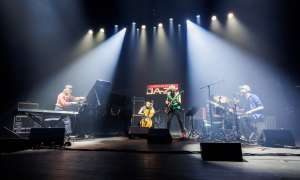Home » Jazz Articles » Interview » Hiromi: The Voice Inside
Hiromi: The Voice Inside

It's always nice to meet the actual people who make my own instruments, because you feel the love of people towards the instrument and you have more respect. I feel responsibility when I play it.
Eight years later, Hiromi is an undoubted star whose busy touring schedule takes her constantly around the world like some rare migratory species. Her fourth CD, Time Control (Telarc, 2007), was thematically based, and her latest recording, Voice (Telarc, 2011), sees another thematic exploration. "This time I wanted to capture the real voices of people—the emotions, the inner voices, things people feel but don't necessarily let out," says Hiromi. "All of these things I tried to capture in these songs."
Voice marks another chapter for Hiromi, as she emerges with a new trio with bass guitar legend Anthony Jackson and the ever-versatile drummer Simon Phillips. Hiromi's trademark lightning-fast playing is of course present in pieces of tremendous finesse. In her heady improvisations, the mixture of classical piano, jazz, blues chords, funk and electro-funk is familiar, for sure. But Voice is arguably Hiromi's finest recording to date, with compositional and emotional strength to match her rare technical wizardry. Despite the similar vocabulary, Voice is also subtly different from her previous recordings: "I'm looking for new things to say whenever I make an album," Hiromi explains, and all the signs indicate that Hiromi is still blooming, still developing her own unique and instantly recognizable voice.
Of course, when Hiromi did burst into the international arena in 2003, at the age of 24, her unique voice was the product of 18 years of study and training, beginning with classical studies from age six, in her hometown of Hamamatsu. Whether it was destiny or happy coincidence, Hamamatsu is also home to the Yamaha Corporation, which provides Hiromi with her beautiful pianos. "It was very nice when I was small," Hiromi recalls. "I could go to visit the factory of Grand pianos, and I could actually meet the people who manufactured them. All the craftsmanship, I could see. It's always nice to meet the actual people who make my own instruments, because you feel the love of people towards the instrument and you have more respect. I feel responsibility when I play it. It was definitely nice to be born in the city where they have the factory."
Fast-forward to 2011, and Hiromi is clearly very pleased with her new recording, Voice, subtitled The Trio Project. For most of the previous eight years, Hiromi had worked with a rhythm section of English electric bassist Tony Grey and Slovakian drummer Martin Valihora, with the addition of guitarist Dave Fiuczynski for two albums. However, Hiromi says: "I'm trying new things. It's the new project I'm doing right now." Anthony Jackson—bass guitar innovator and 40-year veteran of thousands of sessions—was no stranger to Hiromi, having already played on several tracks on her first two CDs, Another Mind and Brain (Telarc, 2004). His super-intuitive counterpoint lines bring a new feel to the rhythm section, but for Hiromi his influence runs much deeper: "He really makes me realize that improvising is composing."
Jackson was more than just first-choice bassist on this project: "I first started writing these songs for this project with Anthony in my mind," Hiromi explains. "If I'm soloing or someone else is soloing, he always composes a beautiful counterpoint. He doesn't really solo solo, but he's always soloing the counterpoint. The counter lines that he comes up with are magnificent; they're amazing."
Bringing Simon Phillips on board to fill the drum chair was also something very natural: "The more I wrote the songs, the clearer the drums' sound got, and I thought about Simon. I asked Anthony what he thought, and he said it was a great choice, and he really encouraged me to contact him. So I contacted Simon, and he was very happy to do it." Phillips has rarely sounded more animated or versatile on record, no doubt due to the freedom given him by Hiromi. Giving freedom to her co-musicians is another essential component of Hiromi's music: "I always do with the musicians I play with. I really want to pull the best out of the musicians I play with."
Although Hiromi is often labeled a fusion musician, in fact only a small proportion of all her music features electric keyboards, including just two tracks on Voice. The funky "Now or Never" is more of an acoustic piano workout, and "Desire," which is colored by grooving synthesizer, features an outstanding, extended piano improvisation. Composer/keyboard maestro Joe Zawinul is the first name Hiromi mentions when talking of her electric keyboard influences, though she is quick to emphasize that there are too many influences to name.
One of the tracks on Voice, "Flashback," sees Hiromi briefly flirt with a Miles Davis melody, which brings up the question of her personal voice and its relationship with influences. Is Hiromi aware of other people's voices coming through her as she plays? "No, never," she states. "I think when you play thinking about, 'Okay, let's play a little bit of this,' these aren't your real words. We all do borrow words from people; when a baby starts talking, it imitates what its parents say and starts to talk like its parents. Then when you get to have some friends, you imitate what your friends are saying, and you develop your own words in choosing what you like, and you make your own style. You have to digest it in yourself so you can speak with your own words. I am influenced by many different people and many different musicians, and I never know what comes from who. It's never like that."
Classical music has obviously left as large an imprint on Hiromi's music as that of any other type of music. This is especially apparent in the serene introduction to "Voice," the opening track on the CD, but it permeates all her improvisations. Her love of classical music has previously led Hiromi to interpret compositions by Claude Debussy and Johann Pachelbel, and on her latest CD she brings a delightful, bluesy swing to Ludwig Van Beethoven's Piano Sonata No. 8, "Pathetique."
Hiromi's classical-music upbringing raises the question as to whether she might like to pursue a parallel career as a classical recording artist, in the way Keith Jarrett has, but Hiromi's answer is perhaps a little surprising: "No," she says without hesitation. "That's a sound I respect and really love and I don't think I am capable [laughs]. I understand that you need to devote your life to classical music. All the classical pianists that I love give all their life to play classical music. I'm interested in writing music and in playing with a band. I love playing improvisational music. That's my focus, and that's what I want to keep developing. I need another life to do classical music [laughs]."
That said, Hiromi has long harbored ambitions to write a piano concerto and perform with a symphony orchestra. This dream was realized at the end of 2010, when Hiromi performed her own arrangements for piano with a symphony orchestra in Japan. The performance was not recorded, but Hiromi has high hopes to do more of the same: "I'd love to do more with as many orchestras as I can," she enthuses.
In fact, the last few years have seen Hiromi branching out in a number of stimulating and diverse contexts. There was the piano duet with pianist/keyboard player/composer Chick Corea, simply titled Duet (Concord Records, 2009), which captured the best of three electrifying performances in Japan at the end of 2007. "It was just so much fun and inspirational," recalls Hiromi. "I enjoyed every minute of it. I felt so excited to play with Chick. Just listening to him as one of the audience is fun, but when I'm allowed to say something back musically then that's more fun [laughs].
Although Hiromi had always given occasional solo performances, the release of her solo piano recording Place to Be (Telarc, 2010) has been an important development for her: "Since the record, I have more opportunity to play solo concerts, though mainly I tour with my trio." It's not just about increased opportunities to perform, however, as the experience has contributed to making Hiromi a more confident pianist: "Oh, yes, I am. I definitely am. You know, I feel more prepared. I'll do six shows, two sets a night. I'm physically capable of doing six nights of two sets and, yeah, it's definitely given me some kind of confidence." A year later, Hiromi hooked up with two of the giants of fusion, bassist Stanley Clarke and drummer Lenny White, to record what was, ironically, the all-acoustic Jazz in the Garden (Heads Up, 2009). "It was amazing and so beautiful," Hiromi recalls enthusiastically. "We did a tour together at the end of last year. For learning, it was the best school to be in [laughs]."
On a seemingly never-ending upward artistic curve, the devastating earthquake and tsunami that rocked Japan in March, 2011 temporarily but immediately redirected Hiromi's focus: "I went back two days after." Although Hiromi states that her home town of Hamamatsu suffered no physical damage, it's clear that the psychological effects of the earthquake and tsunami left no part of Japan untouched: "It was hard for all Japanese people; it was very shocking. People were really depressed, so I just went back and did a lot of TV and radio performances to cheer people up. I also did 18 benefit shows to raise some donations. I just tried to do what I can do."
Hiromi was moved by the world's sympathetic response to the devastation wrought on Japan, but more profoundly moved by the behavior of her own people: "I was very proud of how people reacted to this shocking thing. People who suffered actual physical damage were very respectful towards each other. They were all thinking about others and trying to help each other, and I think that is the core of Japanese people. Musicians always tell me they love going to Japan and they love the culture of hospitality and the kindness, and I think it was really shown when people were without power and without water, and when the supplies came, people just made a long line and stood in line respectfully and quietly and nobody went crazy. A lot of people told me that can only happen in Japan, and this makes us strongly believe in the potential of a quick recovery from this incident."
Once again, Hiromi is focused on developing her music, and her enthusiasm for this new project with Jackson and Phillips is clear: "From the first rehearsal, I just knew it would be great; I really loved it from the very beginning. We had a chemistry together which was very nice, and it was amazing fun. I could see the potential from the beginning." The musical empathy between these three outstanding musicians is evident throughout Voice, and the trio has maybe only begun to tap its potential. "Of course, when you're touring it's developing even more," says Hiromi."
Hiromi understands that by putting herself in new situations, whether solo, in a duo, at the heart of a symphony orchestra or in new collaborations with outstanding musicians, she will continue to grow as a musician. That Jackson has seemingly afforded the pianist new insight into the art of improvisation— combined with her growing confidence—sets the nerve endings tingling at the prospect of what adventures may lie ahead for the unique, exhilarating voice that is Hiromi.
Photo Credit: Courtesy of Hiromi / Telarc
Tags
PREVIOUS / NEXT
Hiromi Concerts
Support All About Jazz
 All About Jazz has been a pillar of jazz since 1995, championing it as an art form and, more importantly, supporting the musicians who make it. Our enduring commitment has made "AAJ" one of the most culturally important websites of its kind, read by hundreds of thousands of fans, musicians and industry figures every month.
All About Jazz has been a pillar of jazz since 1995, championing it as an art form and, more importantly, supporting the musicians who make it. Our enduring commitment has made "AAJ" one of the most culturally important websites of its kind, read by hundreds of thousands of fans, musicians and industry figures every month.



























